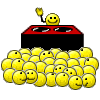Hi Cindy,
Ah, the dilemma of turning a passion for profit. I knew many music lovers who tried that and their careers went "bung". But is it a mistake of the career choice or is it a self management problem within that choice?
I think it is the latter in most cases - just not having the best way of doing it rather than the doing it in the broadest sense. I think for most people's mental health they need a hobby outside of earning - even if what they do to earn money is a real passion? Now if one is in a really horrid work type/environment (subjectively for preferences and maybe even objectively) that can't be healthy. So trying to have art/music when exhausted from a bad job will be a challenge - but I know a few people who did just that: a day job and a passionate life.
I spent 20 years in IT (great earning potential but a real hard one to keep balanced work/life wise) and then when my husband was dying the hospice had a "diversionary therapy" of ceramic plate painting. It got me hooked and bit by bit I was doing more and more and then did a whole "TAFE" diploma in Ceramics. Most folks thought it was a very strange thing for me to do (never having shown any artistic skills!) and thought I'd taken leave of my senses.
Not having shown more than technical/logical/managerial skills to the world also had me doubt my own sanity. Then after my husband died I visited the pastoral care person at the hospice and she just put me onto the book by Julia Cameron "The Artist's Way". I went to the bookshop and thought "ick, newage waffle". But I remembered how good this person's advice / support had been (a real SF person!) and decided to trust.
The book is like a self run bootcamp to "unblock" your creativity - daily and weekly exercises. Boy, did I kind of feel self conscious and silly doing a lot of them. (Daily writings called "morning pages", kid-type of artistic things to make dreams visual etc) and good concepts - one of them being the concept of a "crazy maker" - the people in your life who disrupt themselves and all around them - and how they have us as sometimes willing hostages.
Another one is all about our inner critic (both of these are real INTJ banes).
(btw - Crazymakers are people we fail to deal with effectively because we can kind of depend on them to help us stay put in our "boxes" - ie. they are trying to confound us just by being themselves and we can use them as an excuse! Crazymakers hate it when you deal with them to remove their effect from your life too!)
Anyway I stuck it out and ended up doing the TAFE Diploma. I'd found a new way of looking at the stuff that "the world" told me that kept me in "my place". My INTJness in the course had me behave and think very differently from the others but made it easy to get the necessary discipline to develop skills I would never have believed possible. In the Info tech domain INTJness is seen as "good" but in the art world it can be a perceived as a liability - not enough "feeling" and "flow" but one of my teachers told me some of the most successful artists where more INTJ like or had a partner who had those attributes. The conventional artistic types were more likely to fail to captialise on skills and opportunities. Rather than learning to be more feely I learned to let my intuition get stronger - working out when I was "done" with a piece and not over work it, and surrender to a "flow". I had to stop trying to produce an almost "machined pot" but play with natural imperfections that have character but are not "flawed".
I can't see myself becoming a full time ceramic artist but I wouldn't rule it out. But what I got from the whole experience of the book and the course was that I really didn't have a clue what I could do and how I could really limit myself.
Prior to this I'd done quite a bit of self development work privately and professionally and had sorted out all the "adult in business" stuff (that challenges, matures, broadens and toughens us) that was counter productive inner critic and beliefs, but not with the (dare I, an INTJ, say it) "inner child" stuff - really what brings us joy. I realised how low my expectations for joy were! So, how much is enough "joy"? I don't know. You can't make joy, just get rid of as many barriers to accessing it as you can (internal and external ones) to experiencing it when it is there. What I am trying to express here is that joy is a kind of "flow" thing -
Flow (psychology - Wikipedia, the free encyclopedia)
a technique and a surrender to "it".
The Julia Cameron stuff has really given me a set of tools about being "blocked". So I managed to unblock myself initially AND helped me work recognise when I was getting blocked up again (and again and again).
I think the INTJ inner critic is a noisy beast. You can't ignore it, but you can befriend it and distract/quieten it long enough to do some great things... Ditto with life's crazy-makers.
hope this makes some sense





